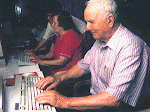Berkeley, CA- The results of a survey performed by the University of California at Berkeley Department of Sociology, and published in the September Online Publishing Module 24 - Education and Education Related Fields (Miscellaneous) are sending shockwaves through the college admissions community. According to the press release, gluten intolerance is now the 3rd most common life adversity discussed by prospective students in college application personal statements.
 |
| College applicant, shown here agonizing over decision to include Twitter handle and most retweeted tweets on resume |
"The finding of gluten intolerance or sensitivity as a condition frequently used to anchor a personal statement wasn't that surprising," lead researcher Hammersmith Wiggins explained. "What we didn't expect was that it had risen so far in the rankings since the last survey went out ten years ago."
Not even cracking the top ten conditions applicants credited for defining their world in 2004, gluten intolerance is inspiring in millions of future college students a deep desire to help change the world in addition to the need to avoid wheat, barley and rye or suffer one or more of over 250 vague symptoms. These can include anything from bloating and abdominal discomfort to fatigue and the ability to communicate with animals.
Admissions experts, like UC Berkeley Provost Alvin Copping, are divided over the use of non-celiac gluten sensitivity as a life adversity. "On one hand, it isn't recognized by the medical community as a legitimate condition. On the other, it can be a real stumbling block for students that just might serve as an impetus for creative solutions or the development of a higher level of emotional intelligence."
Wiggins and his team of researchers are calling for increased awareness of gluten intolerance as a possible focus for applicant personal statements, and warning high school guidance counselors especially to be on the lookout. "We don't think that this is a fad. This finding almost certainly represents a very real shift in our society's approach to the process of introspection and self-evaluation, and it is likely too late to do anything about it. May God have mercy on us all."






